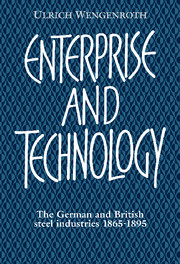Book contents
- Frontmatter
- Contents
- List of figures
- List of tables
- Preface
- List of abbreviations
- Introduction
- 1 The technology of late nineteenth-century steelmaking
- 2 Expanding into the Slump: the railways as major customers of the new steel industry
- 3 Surmounting the Slump: the individual strategies of firms
- 4 Surmounting the Slump: collective strategies
- 5 New processes and new markets
- 6 Efficiency and capacity for innovation
- Sources and bibliography
- Index
Introduction
Published online by Cambridge University Press: 18 January 2010
- Frontmatter
- Contents
- List of figures
- List of tables
- Preface
- List of abbreviations
- Introduction
- 1 The technology of late nineteenth-century steelmaking
- 2 Expanding into the Slump: the railways as major customers of the new steel industry
- 3 Surmounting the Slump: the individual strategies of firms
- 4 Surmounting the Slump: collective strategies
- 5 New processes and new markets
- 6 Efficiency and capacity for innovation
- Sources and bibliography
- Index
Summary
The age of steel’ is what David Landes called the last thirty years of the nineteenth century in his standard work on the industrialisation of Western Europe. He felt that this epoch was wholly dominated by the rise of modern mass production of steel. This was also a period when Great Britain was forced to surrender her previously unchallenged position as the ‘workshop of the world’ and as the most powerful industrial nation. The USA and Germany proved better adjusted to the demands of the new steel age. Not only did they both overtake their British tutor's initial lead, but they soon established themselves at the forefront of world steel production. By the end of the eighties American steel production, and by the beginning of the nineties German steel production too, had exceeded the output of British works, which in the seventies had still dominated the world market. Although the American steel industry presented scarcely any direct competition to British steel, having unique opportunities for expansion within its enormous and protected internal market, when the production and export success of the German steelworks was compared with the relatively backward British performance, it was not long before the British industry was charged with neglecting to follow up its technological advances.
Given that all the standard innovations of the new steel technology, the Bessemer, Thomas and Siemens-Martin processes, had been developed during the sixties and seventies in Great Britain – the last with French assistance – British entrepreneurs were reproached for failing to exploit to optimum advantage the opportunities which had been offered first to them.
Information
- Type
- Chapter
- Information
- Enterprise and TechnologyThe German and British Steel Industries, 1897–1914, pp. 1 - 10Publisher: Cambridge University PressPrint publication year: 1993
